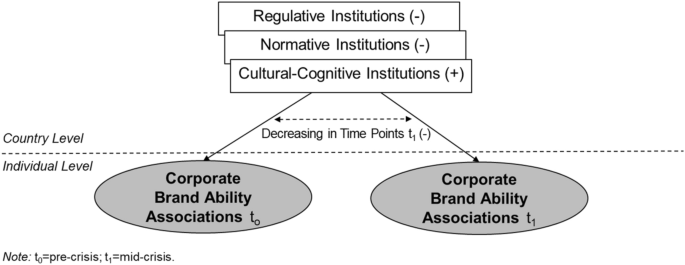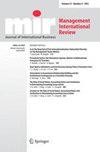Effects of National Institutions on Corporate Brand Ability Associations During the Pandemic
IF 4.1
3区 管理学
Q2 MANAGEMENT
引用次数: 0
Abstract
Abstract During the COVID-19 pandemic, consumer behavior and brand preferences changed. However, surprisingly little is known about how or why corporate brand associations differ and change across countries during such black swan events, especially for multinationals with a specific expertise and ability, for example, to offer vaccines. The authors use institutional theory to fill this gap. They contribute to international business research by analyzing the roles of national institutions in consumers’ corporate brand ability associations (CBAA) in 20 countries over time. They find generally different roles of regulative, normative, and cultural-cognitive institutions in consumers’ CBAA. Moreover, those roles changed and varied for Pfizer, as a multinational corporation that offered the first vaccine in Western countries, and its competitors before and during the pandemic. Institutional theory strongly complements signaling theory in cross-national studies on CBAA. This study shows, for the first time, which institutions drive CBAA cross-nationally and why the role of each institution changes during a black swan event, such as COVID-19. It has direct implications for managers interested in cross-national consumer responses.

疫情期间国家制度对企业品牌能力关联的影响
新冠肺炎疫情期间,消费者行为和品牌偏好发生了变化。然而,令人惊讶的是,对于在此类黑天鹅事件期间各国企业品牌关联的差异和变化,特别是对于具有特定专业知识和能力(例如,提供疫苗)的跨国公司而言,了解甚少。作者利用制度理论填补了这一空白。他们通过分析国家机构在20个国家的消费者企业品牌能力协会(CBAA)中的作用,为国际商业研究做出了贡献。他们发现,在消费者的CBAA中,规范性制度、规范性制度和文化认知制度的作用普遍不同。此外,辉瑞公司作为一家跨国公司,在西方国家提供了第一种疫苗,其竞争对手在大流行之前和期间,这些角色发生了变化和变化。在CBAA的跨国研究中,制度理论是信号理论的有力补充。这项研究首次展示了哪些机构在跨国范围内推动CBAA,以及为什么每个机构的作用在黑天鹅事件(如COVID-19)期间发生了变化。这对关注跨国消费者反应的管理者有直接影响。
本文章由计算机程序翻译,如有差异,请以英文原文为准。
求助全文
约1分钟内获得全文
求助全文
来源期刊

Management International Review
MANAGEMENT-
CiteScore
6.50
自引率
11.60%
发文量
34
期刊介绍:
Management International Review publishes research-based articles that reflect significant advances in the key areas of International Management. Its target audience consists of scholars in International Business Administration.
Management International Review is a double-blind refereed journal that aims at the advancement and dissemination of research in the fields of International Management. The scope of the journal comprises International Business, Cross-Cultural Management, and Comparative Management. The journal publishes research that builds or extends International Management theory so that it can contribute to International Management practice.
Management International Review welcomes both theoretical and empirical work. Original papers are invited that are based on a solid theoretical basis and a rigorous methodology. In the area of empirical studies, the journal publishes both quantitative and qualitative research. To be published in
Management International Review, a paper must make strong contributions and highlight the significance of those contributions to the field of International Management. The editors are especially interested in manuscripts that break new ground rather than papers that make only incremental contributions.
Management International Review publishes articles and research notes. Every year, six issues are published. On average, two of these issues are Focused Issues, which concentrate on a specific subfield of International Management.
 求助内容:
求助内容: 应助结果提醒方式:
应助结果提醒方式:


